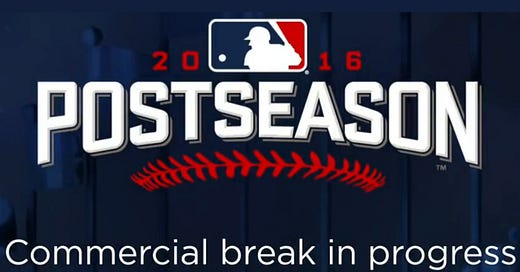Baseball and Television: Piracy
This was organized baseball’s worst nightmare.
Sure, there are only a few ads here that specifically mention watching baseball on television during a meal. Still, it’s obvious that there was a problem. After all, how were fans expected to care at all about the Hazleton Mountaineers when they could pop over to Lou and Joe’s to grab a sandwich and watch the Phillies take on the Cardinals?
Pirating televised sports is no new concept. The idea of heading over to a sports bar or a sandwich shop to watch the game is a tradition as old as television. It’s also not really all that different than latching onto a bootleg broadcast stream instead of paying the television monopoly directly. Either way, you’re consuming the product without paying the price.
Well, for the most part, that is.
Live Broadcast
In sports, live broadcasts are king.
There’s no question that live broadcasts are preferrable to every other option. And this is coming from somebody who absolutely loves watching vintage sports broadcast, somebody who spends far too much time doing so. In fact, I was watching an old 1984 BYU football game earlier today.
Still, nothing can make up for a live broadcast. Fans know that they need to find out what happens today, right now — not tomorrow or during the weekend. Nobody wants to avoid all news sources and human contact just to avoid spoiling the result.
I was a member of an old sports torrent site about 15 years ago. It was called SportScene, and it was pretty popular, with about 10,000 members worldwide. There were always member vacancies and open signups, however, and even the most popular games weren’t downloaded by everybody.
The problem is that watching yesterday’s game isn’t the same as watching the game live. You can’t download a copy of a game currently in progress via torrent or Usenet or direct download or any of those sources. Waiting 12 hours for encoding to finish and for the seeders to set things up is a pain, and having to keep files in your download folder to ensure your ratio is good enough is even worse.
Most people who pirate sports don’t bother with yesterday’s games. Instead, they go on the prowl throughout the darker corners of the internet, armed with ad blockers and Pi-Holes, hunting through garbage links and broken sites to find a working link.
Actually, it’s never been as easy as it is today. Pirate streams hosted on YouTube are surprisingly common, especially for college football games — and streams for more obscure games are rarely taken down. Ad blockers are incredibly effective, and the ubiquity of VPNs makes surrounding yourself with privacy as easy as clicking a button.
But, of course, live broadcasts mean commercials. And that might be the key to unraveling the whole puzzle.
Advertising
I’ve never understood why Major League Baseball has had so much difficulty selling advertising spots between innings of streaming broadcasts.
It makes no sense to me. You’ve got a captive audience, after all. Commercials aren’t suddenly less effective or worthless just because the audience is streaming the broadcast.
I suppose you could argue that advertisers and networks don’t know what to charge for those commercial breaks because it’s not clear how large the audience is. But, of course, that doesn’t stop certain companies from throwing out wild estimates of how much money piracy removes from the market.
When the internet becomes involved, it seems that people throw away all basic rules of advertising, salesmanship, and economics, concluding that things are just “different” and impossible to understand. But why? I mean, if you know people are going to pirate your stream no matter what, why not advertise to them? If you know consumers aren’t going to pay $60 per month for ESPN alone, why not cut the price way down and charge advertisers more to reach them?
There’s something scary about all of this, though — something scary yet familiar. My father works in the newspaper industry. That industry’s chronic inability to adapt to new advertising concepts and creative revenue streams has been extremely destructive. Could television be heading down the same path?





